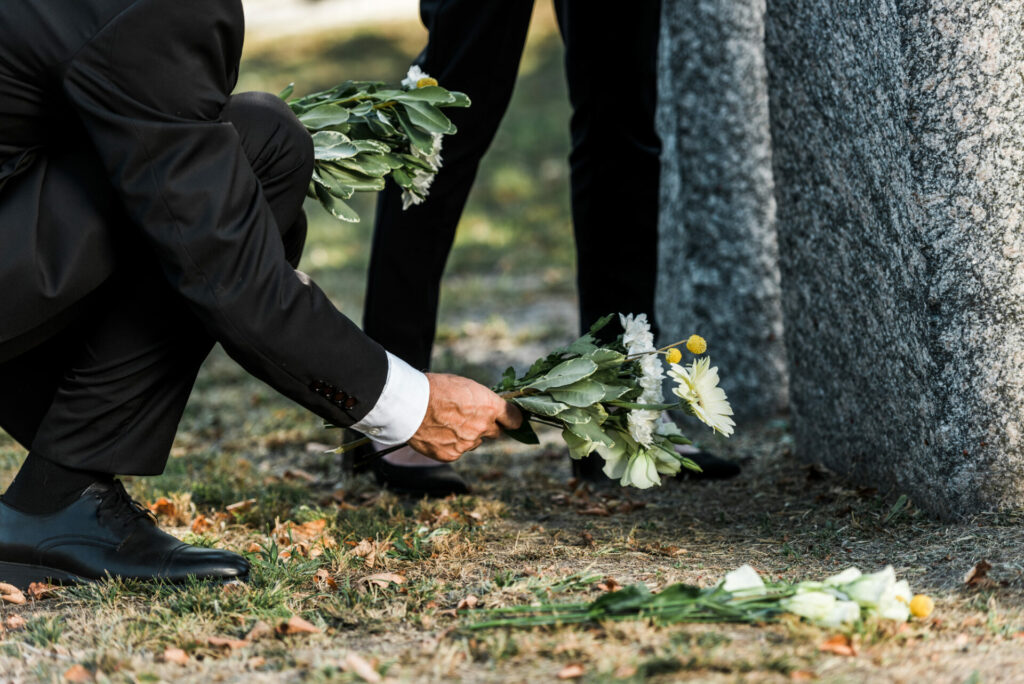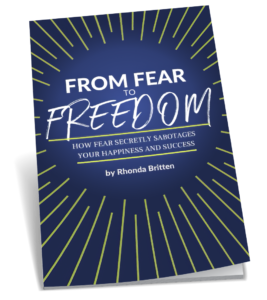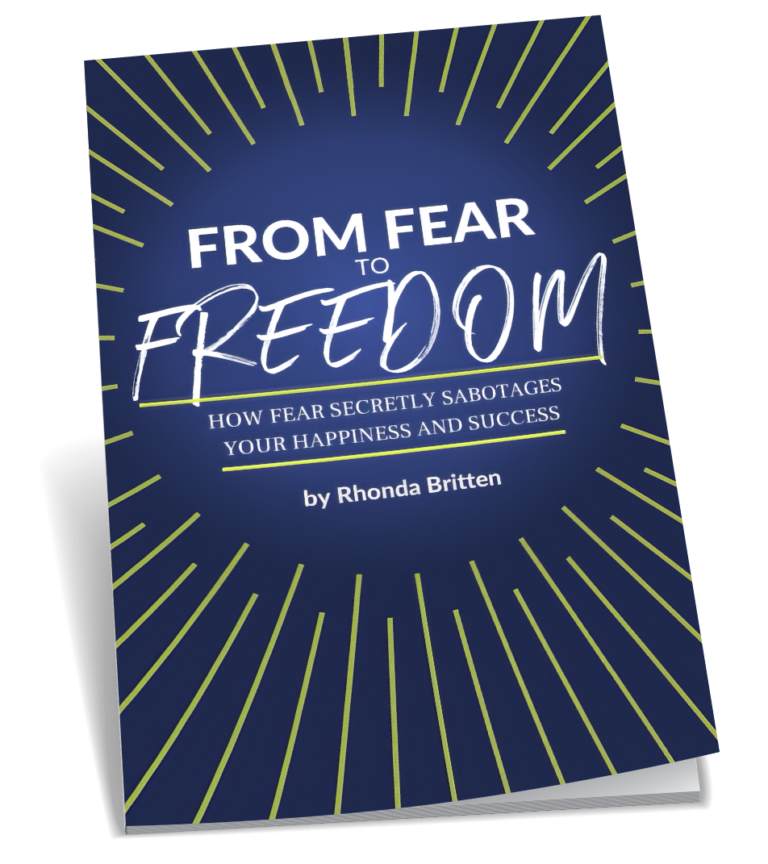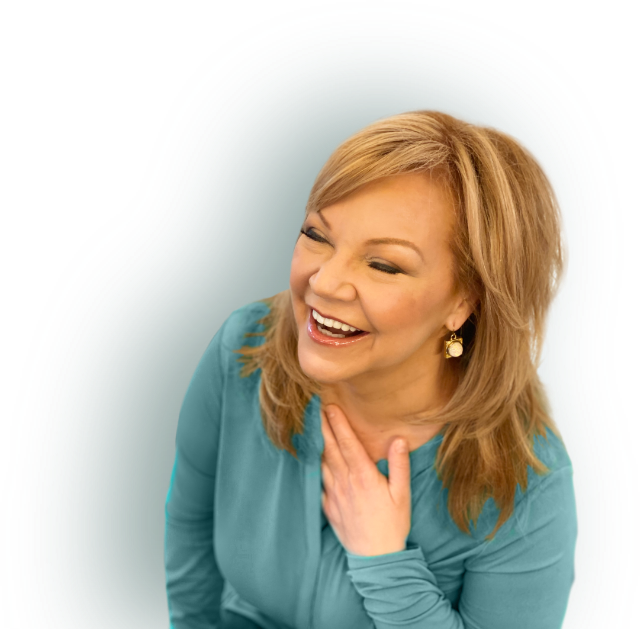We go through so many major transitions in our lives, from elementary school to high school to building a career to finding a new career to dating to marriage to divorce to illness to recovery, and so on.
Such changes are tough; wouldn’t it be easier if everything just remained the same? While it might be easier, we don’t always have a say in whether or not things change.
Life continues to change whether you want it to or not.
We’ll face challenging periods—that’s just how it works! It’s up to us to find a way to move forward. But how do you manage life transitions? How do you find that path forward? And how do you manage the often debilitating fear that comes with both change and the unknown?
I’m so glad you asked! Because that’s exactly what I’ll be talking about today. Change happens—there’s no ifs, ands, or buts about it. But why is change so tough if it’s such a natural part of our lives?

How can we survive and thrive in the face of the major transitions we go through over the course of our lives? How can we work with change instead of against it, and how can we process and manage the changes that are thrust upon us?
Folks, let’s dig into it!
Why Are Life Transitions So Hard?
Life transitions are hard because they’re usually major changes to our status quo. You’ve gotten used to something. You’re comfortable.
If you spend 15 minutes in the hot tub and then jump into the pool, it’s going to be a shock. Even if you take it slow and get in a little bit at a time, the chill is going to pass through your entire body. The transition is challenging because it’s a major change to your body’s temperature. Your body was comfortable, and now it’s not. Your body will be comfortable once it gets used to the temperature, but it’s going to take time.
Life transitions represent a drastic change to our everyday life.
The ground underneath our feet shifts; the foundation we’ve built over days, months, and YEARS crumbles. We need to adjust to the new normal and build a whole new foundation to stand on.
Human beings can face quite a number of significant transitions in their lives, including:
- Puberty
- Break-ups
- Divorce
- A cancer diagnosis for you or a loved one
- The death of a loved one
- Being diagnosed with a chronic or terminal illness
- The birth of a child
- A child going off to college
- Menopause
- A job loss or career change
- Other personal crises, such as bankruptcy, rehab, a house fire, car crash, etc.
Our lives can change in any number of ways at any time. And despite the fact that change is inevitable and implicit in every facet of our lives and surroundings, the idea of it is still scary, and its reality can be difficult to work through.
Even GOOD changes, like moving on to a career you’re extremely excited about, are intimidating. After all, you were good at your last job; you knew the ins and outs, and you felt secure in that knowledge. Learning the ins and outs of a new job and making new friends will be challenging. It’s a big change, and change sparks fear. “What if I can’t do it? What if I FAIL?!?”
Human beings are creatures of habit, so fear of change is natural. In fact, it’s one of the most common emotional fears we speak about at Fearless Living because guess what? WE CAN ALL RELATE TO IT! We fear change because we like being COMFY. Even if we don’t enjoy our current circumstances, we’re familiar with them. We know what to expect. We fear change because it represents the unknown—another one of our major emotional fears.
Learn more: What Causes Fear, and How Do We Respond to It?
But my friends, here’s the thing: Your life will change. We all have to manage lost youth, lost jobs, lost loved ones, and so much more. Managing life transitions and massive life disruptions is an essential life skill, maybe our most essential life skill, but that definitely doesn’t mean it’s easy!
The more you avoid change and try to fight it, the more your fear of change will control you. It’s like a finger trap. The more you pull away, the more you get stuck. Nothing stays the same forever, and while it can be tough to see it, CHANGE IS A GOOD THING. Change brings growth, learning opportunities, and endless possibilities.
How Long Do Life Transitions Last?
My fearless friends, I wish I could answer that question! But truthfully, there is no set time. There isn’t a formula for how long it takes to work through a life transition. It could take days. It could take months. It could take years. It could even take decades.
It’s different for everyone, so take each life transition at your own pace. Do not compare yourself to others, as everyone is different, and everyone processes things in their own way. Grief will affect some more than others, as will newfound success.
It took me two decades to begin to work through the death of my parents and finally forgive myself for that horrific day.
I was stuck in a cycle of fear—stuck on the Wheel of Fear—for so long. But my journey took just as long as I needed. And I’m so grateful that every step I took led me here, speaking to YOU right now!
The amount of time it takes to process a life transition has nothing to do with being stronger or weaker than anyone else. Take things as they come, reach out to people you trust for help, and focus on putting one foot in front of the other.
How Do You Go Through Transitions Free From Fear?
As I already mentioned, change is inevitable. There’s nothing you can do to stop it, and your life will be full of many major transitions. Some changes will be better and easier than others. Some changes will feel awful. Some changes will challenge you in ways you never imagined possible.
Each transition will take time to get used to, and each will spark fear in its own way. So, how do you embrace the transitions in your life, from marriage to divorce to birth to death to unemployment to employment to poor to rich to young to old and everything in between? Let’s work through some of life’s most common transitions.
There are so many different types of life transitions, and although I’ll only speak about a few below, many of these principles (and each of the foundations of Fearless Living) can be applied to every single type of life transition you may experience.
The Transition of Loss

The loss of a loved one is one of the great tragedies you will face in life. Every person on the entire planet, one way or another, has lost or will lose all of the people (or pets!) they love. And as every one of them can tell you—myself included!—losing someone you love is a major life transition.
It’s okay to be sad. It’s okay to be angry. It’s okay to be in pain. It’s okay to feel numb. It’s okay not to want to get out of bed in the morning. You are going through a devastating time in your life. No positive attitude, mind-numbing substance, or self-destructive distraction is going to change that.
If someone you love dies, don’t deny how you feel. You’re in pain because loss is painful. There’s nothing wrong with you for feeling the way you feel. While you probably want to escape these painful feelings, the more you deny them, the longer they will last, and the more likely you’ll crack and explode when you least expect it.
I wish I allowed myself the space to feel my feelings when my father killed my mother and then himself. Instead, I buried my feelings deep down. I denied them. I fought them off and did everything I could to distract myself from my feelings, whether it was alcohol, bad relationships, suicide attempts—anything to not feel my feelings.
But friends, all this did was prolong my grief, pain, and fear for over 20 years. For 20 years I was running, both in my waking life and in my dreams.
The loss of a loved one isn’t meant to be easy, and grief should never be experienced in a vacuum. Reach out to your friends, family, and community for help. While it may feel safer to feel your feelings alone, trust me; you need to talk about it. You need to process your feelings OUT LOUD.
The road to acceptance is long; don’t walk it alone. Our community at Fearless Living knows the transition of loss intimately. Don’t hesitate to reach out to someone if you want a friendly ear or virtual shoulder to lean on.
The Transition of a New Career

While not as poignant as the loss of a loved one, the loss of a career is still very destabilizing to your identity and sense of self. You spend most of your day-to-day life working your job, so changing careers or not working at all is quite a transition.
If you’re not working, you may feel as though you have nothing to contribute. You may feel useless. You may feel like a failure. If you’re working a different job, you will need to learn the ins and outs, and any initial missteps could also leave you feeling like a failure, like you’re incapable of doing anything right. But this is not the case.
Moving on from your current job is an opportunity. It’s a chance to learn and grow. It’s a chance to try something you’ve never tried before and challenge yourself in ways you’ve never been challenged.
Or maybe you haven’t lost your job, but you’re incredibly unhappy in your current career. You spend nearly every moment at your job wishing you were somewhere else doing something else, anything else, but your job means security. What if you leave your job to find you’re not capable of doing anything else?
➡️ Learn how to become a better leader: 8 Tips to Boost Your Confidence at Work.
Choosing to make a career transition is tough, too, but it’s also a huge opportunity. You have the power to reinvent your own life and create your own happiness.
You have the power to live the life your soul intended™.
But to do that, you must, must, MUST embrace a little risk. Take a chance on yourself!
Too often, when we hear the word ‘risk,’ we automatically assume it’s something bad.
But not all risks are bad. Risks are absolutely necessary.
I wouldn’t be where I am today without taking risks! Sure, I was worried no one was going to buy my book. I thought no one was going to watch my show. I even thought no one would tune in to Oprah when I was on!
By the way, I have A LOT to say about the benefits of taking risks, so when you’re finished reading this article, I encourage you to read my guide on How Taking Risks Can Lead You to a Better Life.
Pursuing my job as a Life Coach was a huge risk because life coaching wasn’t even a thing when I started 20 years ago. It was a major transition, and I was definitely scared, but I kept asking myself what I truly wanted.
What did I need from my career? I realized I needed to express myself. I needed to help people just like me free themselves from fear.
Can you relate to those needs? If, like me, you feel a need to make a career change and not only free yourself but free others from fear, I encourage you to consider becoming a Life Coach at Fearless Living. Learn more about the incredible opportunities that come with becoming a Life Coach in my guides: What Does a Life Coach Do? and How to Gain a Life Coaching Certification.
The Transition of Divorce or a Break-Up

The end of a relationship is another major life transition, as your partner is a huge part of your life. Their absence leaves what feels like an unfillable hole. While your impulse may be to fill this empty space with new relationships or self-destructive habits, this transition is an opportunity to refocus on your own needs and identity. What are your needs beyond your relationships? Who are you when it’s just you? What do you need to feel content? What are your boundaries? What do you like? What do you dislike?
It’s incredibly difficult at first while you're dealing with the pain, emotion, and grief—because we absolutely do grieve the loss of a relationship. So much of your life is wrapped up in your romantic relationships. When they’re gone, a part of yourself feels like it’s gone too, and it’s natural to grieve that loss.
During this time, it’s incredibly important to show compassion to yourself and practice self-care.
Build back your self-love and self-trust. This transitional journey is about you—it’s not about finding a replacement right away. It’s about rediscovering YOU again.
💗 Read my guides on self-love and self-trust:
- How to Trust Yourself and Build True Self-Confidence
- How To Love Yourself: 7 Self-Love Tips You’ll Love
Not knowing yourself and your own needs can lead to toxic relationships. Once you work on yourself—your own needs, goals, and dreams—you’ll be better equipped to find someone compatible.
You’ll have the tools you need to build a strong, healthy relationship. Or not! You may discover you don’t need a romantic relationship to feel satisfied. A hot cup of tea, a good book, and a cat nuzzling your feet may be all you need to feel content—and that is FANTASTIC.
It’s natural to feel pressure to “get back out there” when a relationship ends, but it’s so, so, SO important to first develop your relationship with yourself. It’s only through reconnecting with the person you were before the relationship that you discover who you are now.
I know—this kind of major change is scary, and you may doubt your ability to carry on by yourself. But remember: You’re not alone! When things get tough, reach out to your friends, family, and the welcoming community at Fearless Living.
Overcoming Fear of Change and Fear of the Unknown
Earlier in this article, I talked about the grip that fear of change and fear of the unknown can have on us. Both can keep us feeling stuck—paralyzed, languishing in place, and growing stagnant. These common fears affect each and every one of us, so know that you’re not alone.
If you are going through a life transition or if you’re someone who worries about these types of events occurring, I highly recommend you work through my Overcoming Fear of Change course and my Overcoming Fear of the Unknown course. Each takes a deep dive into the neuroscience behind these fears, helps you understand what triggers your fear, and gives you clear and actionable strategies you can utilize to overcome your fears.
All of my courses can be taken separately, or if you’d like to catapult your Fearless journey forward, join Fearless You. A Fearless You membership gets you unlimited access to all of my courses—there are dozens of them, as well as new monthly sessions, bonus content, and a chance to work with myself and my coaches every month!
We go through so many major transitions in our lives, from elementary school to high school to building a career to finding a new career to dating to marriage to divorce to illness to recovery, and so on.
Such changes are tough; wouldn’t it be easier if everything just remained the same? While it might be easier, we don’t always have a say in whether or not things change.
Life continues to change whether you want it to or not.
We’ll face challenging periods—that’s just how it works! It’s up to us to find a way to move forward. But how do you manage life transitions? How do you find that path forward? And how do you manage the often debilitating fear that comes with both change and the unknown?
I’m so glad you asked! Because that’s exactly what I’ll be talking about today. Change happens—there’s no ifs, ands, or buts about it. But why is change so tough if it’s such a natural part of our lives?

How can we survive and thrive in the face of the major transitions we go through over the course of our lives? How can we work with change instead of against it, and how can we process and manage the changes that are thrust upon us?
Folks, let’s dig into it!
Why Are Life Transitions So Hard?
Life transitions are hard because they’re usually major changes to our status quo. You’ve gotten used to something. You’re comfortable.
If you spend 15 minutes in the hot tub and then jump into the pool, it’s going to be a shock. Even if you take it slow and get in a little bit at a time, the chill is going to pass through your entire body. The transition is challenging because it’s a major change to your body’s temperature. Your body was comfortable, and now it’s not. Your body will be comfortable once it gets used to the temperature, but it’s going to take time.
Life transitions represent a drastic change to our everyday life.
The ground underneath our feet shifts; the foundation we’ve built over days, months, and YEARS crumbles. We need to adjust to the new normal and build a whole new foundation to stand on.
Human beings can face quite a number of significant transitions in their lives, including:
- Puberty
- Break-ups
- Divorce
- A cancer diagnosis for you or a loved one
- The death of a loved one
- Being diagnosed with a chronic or terminal illness
- The birth of a child
- A child going off to college
- Menopause
- A job loss or career change
- Other personal crises, such as bankruptcy, rehab, a house fire, car crash, etc.
Our lives can change in any number of ways at any time. And despite the fact that change is inevitable and implicit in every facet of our lives and surroundings, the idea of it is still scary, and its reality can be difficult to work through.
Even GOOD changes, like moving on to a career you’re extremely excited about, are intimidating. After all, you were good at your last job; you knew the ins and outs, and you felt secure in that knowledge. Learning the ins and outs of a new job and making new friends will be challenging. It’s a big change, and change sparks fear. “What if I can’t do it? What if I FAIL?!?”
Human beings are creatures of habit, so fear of change is natural. In fact, it’s one of the most common emotional fears we speak about at Fearless Living because guess what? WE CAN ALL RELATE TO IT! We fear change because we like being COMFY. Even if we don’t enjoy our current circumstances, we’re familiar with them. We know what to expect. We fear change because it represents the unknown—another one of our major emotional fears.
Learn more: What Causes Fear, and How Do We Respond to It?
But my friends, here’s the thing: Your life will change. We all have to manage lost youth, lost jobs, lost loved ones, and so much more. Managing life transitions and massive life disruptions is an essential life skill, maybe our most essential life skill, but that definitely doesn’t mean it’s easy!
The more you avoid change and try to fight it, the more your fear of change will control you. It’s like a finger trap. The more you pull away, the more you get stuck. Nothing stays the same forever, and while it can be tough to see it, CHANGE IS A GOOD THING. Change brings growth, learning opportunities, and endless possibilities.
How Long Do Life Transitions Last?
My fearless friends, I wish I could answer that question! But truthfully, there is no set time. There isn’t a formula for how long it takes to work through a life transition. It could take days. It could take months. It could take years. It could even take decades.
It’s different for everyone, so take each life transition at your own pace. Do not compare yourself to others, as everyone is different, and everyone processes things in their own way. Grief will affect some more than others, as will newfound success.
It took me two decades to begin to work through the death of my parents and finally forgive myself for that horrific day.
I was stuck in a cycle of fear—stuck on the Wheel of Fear—for so long. But my journey took just as long as I needed. And I’m so grateful that every step I took led me here, speaking to YOU right now!
The amount of time it takes to process a life transition has nothing to do with being stronger or weaker than anyone else. Take things as they come, reach out to people you trust for help, and focus on putting one foot in front of the other.
How Do You Go Through Transitions Free From Fear?
As I already mentioned, change is inevitable. There’s nothing you can do to stop it, and your life will be full of many major transitions. Some changes will be better and easier than others. Some changes will feel awful. Some changes will challenge you in ways you never imagined possible.
Each transition will take time to get used to, and each will spark fear in its own way. So, how do you embrace the transitions in your life, from marriage to divorce to birth to death to unemployment to employment to poor to rich to young to old and everything in between? Let’s work through some of life’s most common transitions.
There are so many different types of life transitions, and although I’ll only speak about a few below, many of these principles (and each of the foundations of Fearless Living) can be applied to every single type of life transition you may experience.
The Transition of Loss

The loss of a loved one is one of the great tragedies you will face in life. Every person on the entire planet, one way or another, has lost or will lose all of the people (or pets!) they love. And as every one of them can tell you—myself included!—losing someone you love is a major life transition.
It’s okay to be sad. It’s okay to be angry. It’s okay to be in pain. It’s okay to feel numb. It’s okay not to want to get out of bed in the morning. You are going through a devastating time in your life. No positive attitude, mind-numbing substance, or self-destructive distraction is going to change that.
If someone you love dies, don’t deny how you feel. You’re in pain because loss is painful. There’s nothing wrong with you for feeling the way you feel. While you probably want to escape these painful feelings, the more you deny them, the longer they will last, and the more likely you’ll crack and explode when you least expect it.
I wish I allowed myself the space to feel my feelings when my father killed my mother and then himself. Instead, I buried my feelings deep down. I denied them. I fought them off and did everything I could to distract myself from my feelings, whether it was alcohol, bad relationships, suicide attempts—anything to not feel my feelings.
But friends, all this did was prolong my grief, pain, and fear for over 20 years. For 20 years I was running, both in my waking life and in my dreams.
The loss of a loved one isn’t meant to be easy, and grief should never be experienced in a vacuum. Reach out to your friends, family, and community for help. While it may feel safer to feel your feelings alone, trust me; you need to talk about it. You need to process your feelings OUT LOUD.
The road to acceptance is long; don’t walk it alone. Our community at Fearless Living knows the transition of loss intimately. Don’t hesitate to reach out to someone if you want a friendly ear or virtual shoulder to lean on.
The Transition of a New Career

While not as poignant as the loss of a loved one, the loss of a career is still very destabilizing to your identity and sense of self. You spend most of your day-to-day life working your job, so changing careers or not working at all is quite a transition.
If you’re not working, you may feel as though you have nothing to contribute. You may feel useless. You may feel like a failure. If you’re working a different job, you will need to learn the ins and outs, and any initial missteps could also leave you feeling like a failure, like you’re incapable of doing anything right. But this is not the case.
Moving on from your current job is an opportunity. It’s a chance to learn and grow. It’s a chance to try something you’ve never tried before and challenge yourself in ways you’ve never been challenged.
Or maybe you haven’t lost your job, but you’re incredibly unhappy in your current career. You spend nearly every moment at your job wishing you were somewhere else doing something else, anything else, but your job means security. What if you leave your job to find you’re not capable of doing anything else?
➡️ Learn how to become a better leader: 8 Tips to Boost Your Confidence at Work.
Choosing to make a career transition is tough, too, but it’s also a huge opportunity. You have the power to reinvent your own life and create your own happiness.
You have the power to live the life your soul intended™.
But to do that, you must, must, MUST embrace a little risk. Take a chance on yourself!
Too often, when we hear the word ‘risk,’ we automatically assume it’s something bad.
But not all risks are bad. Risks are absolutely necessary.
I wouldn’t be where I am today without taking risks! Sure, I was worried no one was going to buy my book. I thought no one was going to watch my show. I even thought no one would tune in to Oprah when I was on!
By the way, I have A LOT to say about the benefits of taking risks, so when you’re finished reading this article, I encourage you to read my guide on How Taking Risks Can Lead You to a Better Life.
Pursuing my job as a Life Coach was a huge risk because life coaching wasn’t even a thing when I started 20 years ago. It was a major transition, and I was definitely scared, but I kept asking myself what I truly wanted.
What did I need from my career? I realized I needed to express myself. I needed to help people just like me free themselves from fear.
Can you relate to those needs? If, like me, you feel a need to make a career change and not only free yourself but free others from fear, I encourage you to consider becoming a Life Coach at Fearless Living. Learn more about the incredible opportunities that come with becoming a Life Coach in my guides: What Does a Life Coach Do? and How to Gain a Life Coaching Certification.
The Transition of Divorce or a Break-Up

The end of a relationship is another major life transition, as your partner is a huge part of your life. Their absence leaves what feels like an unfillable hole. While your impulse may be to fill this empty space with new relationships or self-destructive habits, this transition is an opportunity to refocus on your own needs and identity. What are your needs beyond your relationships? Who are you when it’s just you? What do you need to feel content? What are your boundaries? What do you like? What do you dislike?
It’s incredibly difficult at first while you're dealing with the pain, emotion, and grief—because we absolutely do grieve the loss of a relationship. So much of your life is wrapped up in your romantic relationships. When they’re gone, a part of yourself feels like it’s gone too, and it’s natural to grieve that loss.
During this time, it’s incredibly important to show compassion to yourself and practice self-care.
Build back your self-love and self-trust. This transitional journey is about you—it’s not about finding a replacement right away. It’s about rediscovering YOU again.
💗 Read my guides on self-love and self-trust:
- How to Trust Yourself and Build True Self-Confidence
- How To Love Yourself: 7 Self-Love Tips You’ll Love
Not knowing yourself and your own needs can lead to toxic relationships. Once you work on yourself—your own needs, goals, and dreams—you’ll be better equipped to find someone compatible.
You’ll have the tools you need to build a strong, healthy relationship. Or not! You may discover you don’t need a romantic relationship to feel satisfied. A hot cup of tea, a good book, and a cat nuzzling your feet may be all you need to feel content—and that is FANTASTIC.
It’s natural to feel pressure to “get back out there” when a relationship ends, but it’s so, so, SO important to first develop your relationship with yourself. It’s only through reconnecting with the person you were before the relationship that you discover who you are now.
I know—this kind of major change is scary, and you may doubt your ability to carry on by yourself. But remember: You’re not alone! When things get tough, reach out to your friends, family, and the welcoming community at Fearless Living.
Overcoming Fear of Change and Fear of the Unknown
Earlier in this article, I talked about the grip that fear of change and fear of the unknown can have on us. Both can keep us feeling stuck—paralyzed, languishing in place, and growing stagnant. These common fears affect each and every one of us, so know that you’re not alone.
If you are going through a life transition or if you’re someone who worries about these types of events occurring, I highly recommend you work through my Overcoming Fear of Change course and my Overcoming Fear of the Unknown course. Each takes a deep dive into the neuroscience behind these fears, helps you understand what triggers your fear, and gives you clear and actionable strategies you can utilize to overcome your fears.
All of my courses can be taken separately, or if you’d like to catapult your Fearless journey forward, join Fearless You. A Fearless You membership gets you unlimited access to all of my courses—there are dozens of them, as well as new monthly sessions, bonus content, and a chance to work with myself and my coaches every month!







